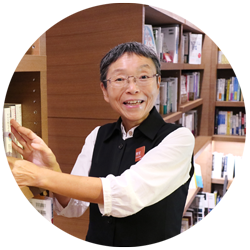[140th] Michiko Mamuro's bookshelf "Elegy Doesn't Flow" by Shion Miura / Futabasha
Known as the "original charismatic bookseller," DAIKANYAMA TSUTAYA BOOKS, who recommends books in a variety of media including magazines and TV.
In this series, we take a peek into the "bookshelves" in the mind of our most popular concierge.
Please enjoy it along with his comments.
* * * * * * * *
"Elegy Doesn't Flow"
Shion Miura/Futabasha
Click on the image to go to the purchase page.
Click on the image to go to the purchase page.
* * * * * * * *
The theme of this book is "Men are stupid." It is high school boys who are told this. Of course, it is the women who say it!
Middle-aged and older men don't call younger people "stupid." Because older men are basically the same as high school boys. They translate "stupid" to young people as "I get it" or "You're so energetic."
Women don't call boys in elementary or middle school "idiots" because it could really hurt their feelings. They don't say it to male university students either. After entering university, they are coated with pride and self-consciousness as "me who will enter society," and they have acquired the skill to brush them off by saying "I heard you say idiot, so what?" It's also a no-no to older men. You can't expect any funny reactions.
Therefore, the only time that women can freely say these words is to high school boys! In this book, there are also a fair number of "You're stupid," "You're stupid," and "You guys are idiots." When these boys are told these words, they react with surprise, remorse, blank stare, or sulk, which entertains the viewer. It's a wonderful call and response.
The setting is Mochiyu Town. As the name suggests, it is a hot spring town. The protagonist is a high school sophomore named Rei, and the story depicts his daily life with his friends Ryujin from the baseball team, Shinpei from the soccer team, Maru-chan from the art club, and Fujishima, the son of a long-established inn.
When Ryuto gets into an argument with some local high school students during a school trip to Karatsu, he takes his opponent to the toilet behind the parking lot to show them what he is trying to show them (it's more vulgar than you might imagine), and when Shinpei finishes eating his lunch, his first words are "I'm hungry." This is a humorous coming-of-age novel that will have you shouting "What an idiot!" to your heart's content, but the highlight of the story lies in what lies deep within Rei.
Usually in this kind of story, the brightness and volume of the story increase by about 20% in the main character's important scenes. But in this book, Rei's scenes sometimes feel a bit strange. This is related to the dream he has at the beginning of the story.
Regardless of whether they can become professionals, Ryuto and Shinpei are devoted to their club activities, and Maru-chan is always sketching, aiming to enter an art school. Fujishima is aware of his role as the successor to the inn. Rei has no goals or ambitions for the future. He is fun to be around, but he feels a gap between him and the others.
He has two mothers. He usually lives with his mother, Hisae, who is barely in her thirties and runs a souvenir shop in the shopping district, and only on the third week of each month does he spend time with his mother, Itsuko, who comes from Tokyo to live in a mansion on a hill in Mochiyu-cho. She is the president of a large company and is in her late fifties.
For example, "Christmas dinner is grilled salmon, fried egg, and seaweed miso soup" versus "A three-meter tree is erected indoors. During New Year's, a kadomatsu pine decoration the size of one at the entrance to a department store is hung at the entrance. You can imagine what the menu for Christmas Eve and the New Year's dishes are like" -- two homes that are very different.
If he were a girl, he would have exaggerated his existence dramatically, and when he became aware of things, he would have demanded an explanation, "What do you mean, you have two moms?!" Rei is still in his second year of high school and can't ask. Not wanting to compare Hisae and Itsuko, he has tried not to worry about which of them would be better as his biological parent. But "living while telling yourself that" is not a stable daily life.
Also, usually one has their own thoughts first and then something happens, but in Rei's case, it's only after something happens that he realizes, "So this is what I was thinking."
For example, when he sees Hisae smiling after seeing his report card, he thinks, "I wanted my mother to praise me and make her happy." When Itsuko asks him about his future and says, "You mean tuition fees? I'll pay for them," he realizes that he had wished he had studied a bit more. There are too many scenes like this for him.
Without a foundation, you can't see the future. Everyone looks ahead when talking about the future, but Rei needs to expose his true self. Why did he have two mothers? What happened to his father? Where did he come from? Who is he?
But I can't, because I'm scared.
I thought Rei was stupid. Hisae and Itsuko are not the kind of people who would be hurt by something like "comparing a souvenir shop to a mansion" or "imagining which one would be better to have as your real mother." They should feel free to tell each other their feelings. I also thought Rei was cute. The "stupid" that older women think of high school boys can be transformed into "adorable."
If you ask people what they are afraid of right now, I think most of them would say infection or recession. But since when have we become so confident and not worry or think about "what kind of person we are and what we will become"?
This book will be enjoyable for those who have had a fun high school life, and will also be relatable to those who, although they are not like Rei and have two mothers, were extremely anxious about the future when they were in high school. I think it's okay to cherish the feeling of "fear" that you feel as a young person for a long time, rather than getting over it.
I wrote that Rei's scenes sometimes seem strange, but at a certain point in the story, he too begins to feel a sense of uncertainty towards his friends and the people in the shopping district. What is that? And what is the secret of the two mothers? Look forward to finding out more! Earthenware will also be appearing!!
Middle-aged and older men don't call younger people "stupid." Because older men are basically the same as high school boys. They translate "stupid" to young people as "I get it" or "You're so energetic."
Women don't call boys in elementary or middle school "idiots" because it could really hurt their feelings. They don't say it to male university students either. After entering university, they are coated with pride and self-consciousness as "me who will enter society," and they have acquired the skill to brush them off by saying "I heard you say idiot, so what?" It's also a no-no to older men. You can't expect any funny reactions.
Therefore, the only time that women can freely say these words is to high school boys! In this book, there are also a fair number of "You're stupid," "You're stupid," and "You guys are idiots." When these boys are told these words, they react with surprise, remorse, blank stare, or sulk, which entertains the viewer. It's a wonderful call and response.
The setting is Mochiyu Town. As the name suggests, it is a hot spring town. The protagonist is a high school sophomore named Rei, and the story depicts his daily life with his friends Ryujin from the baseball team, Shinpei from the soccer team, Maru-chan from the art club, and Fujishima, the son of a long-established inn.
When Ryuto gets into an argument with some local high school students during a school trip to Karatsu, he takes his opponent to the toilet behind the parking lot to show them what he is trying to show them (it's more vulgar than you might imagine), and when Shinpei finishes eating his lunch, his first words are "I'm hungry." This is a humorous coming-of-age novel that will have you shouting "What an idiot!" to your heart's content, but the highlight of the story lies in what lies deep within Rei.
Usually in this kind of story, the brightness and volume of the story increase by about 20% in the main character's important scenes. But in this book, Rei's scenes sometimes feel a bit strange. This is related to the dream he has at the beginning of the story.
Regardless of whether they can become professionals, Ryuto and Shinpei are devoted to their club activities, and Maru-chan is always sketching, aiming to enter an art school. Fujishima is aware of his role as the successor to the inn. Rei has no goals or ambitions for the future. He is fun to be around, but he feels a gap between him and the others.
He has two mothers. He usually lives with his mother, Hisae, who is barely in her thirties and runs a souvenir shop in the shopping district, and only on the third week of each month does he spend time with his mother, Itsuko, who comes from Tokyo to live in a mansion on a hill in Mochiyu-cho. She is the president of a large company and is in her late fifties.
For example, "Christmas dinner is grilled salmon, fried egg, and seaweed miso soup" versus "A three-meter tree is erected indoors. During New Year's, a kadomatsu pine decoration the size of one at the entrance to a department store is hung at the entrance. You can imagine what the menu for Christmas Eve and the New Year's dishes are like" -- two homes that are very different.
If he were a girl, he would have exaggerated his existence dramatically, and when he became aware of things, he would have demanded an explanation, "What do you mean, you have two moms?!" Rei is still in his second year of high school and can't ask. Not wanting to compare Hisae and Itsuko, he has tried not to worry about which of them would be better as his biological parent. But "living while telling yourself that" is not a stable daily life.
Also, usually one has their own thoughts first and then something happens, but in Rei's case, it's only after something happens that he realizes, "So this is what I was thinking."
For example, when he sees Hisae smiling after seeing his report card, he thinks, "I wanted my mother to praise me and make her happy." When Itsuko asks him about his future and says, "You mean tuition fees? I'll pay for them," he realizes that he had wished he had studied a bit more. There are too many scenes like this for him.
Without a foundation, you can't see the future. Everyone looks ahead when talking about the future, but Rei needs to expose his true self. Why did he have two mothers? What happened to his father? Where did he come from? Who is he?
But I can't, because I'm scared.
I thought Rei was stupid. Hisae and Itsuko are not the kind of people who would be hurt by something like "comparing a souvenir shop to a mansion" or "imagining which one would be better to have as your real mother." They should feel free to tell each other their feelings. I also thought Rei was cute. The "stupid" that older women think of high school boys can be transformed into "adorable."
If you ask people what they are afraid of right now, I think most of them would say infection or recession. But since when have we become so confident and not worry or think about "what kind of person we are and what we will become"?
This book will be enjoyable for those who have had a fun high school life, and will also be relatable to those who, although they are not like Rei and have two mothers, were extremely anxious about the future when they were in high school. I think it's okay to cherish the feeling of "fear" that you feel as a young person for a long time, rather than getting over it.
I wrote that Rei's scenes sometimes seem strange, but at a certain point in the story, he too begins to feel a sense of uncertainty towards his friends and the people in the shopping district. What is that? And what is the secret of the two mothers? Look forward to finding out more! Earthenware will also be appearing!!

DAIKANYAMA TSUTAYA BOOKS Literature Concierge
Michiko Mamuro
【profile】
She is the "original charismatic bookseller" who recommends books in various media such as magazines and TV. She has a serial in the magazine "Fujingaho", the online magazine "Tabiiro TABIIRO", and Asahi Shimbun Digital's "Honya no Hon". She is also active as a book critic, and her paperback commentaries include "Tiny Stories" (Yamada Eimi/Bunshun Bunko), "Motherhood" (Minato Kanae/Shincho Bunko), "Meandering Moon" (Sakuragi Shino/Futaba Bunko), and "Staph" (Michio Shusuke/Bunshun Bunko).

























